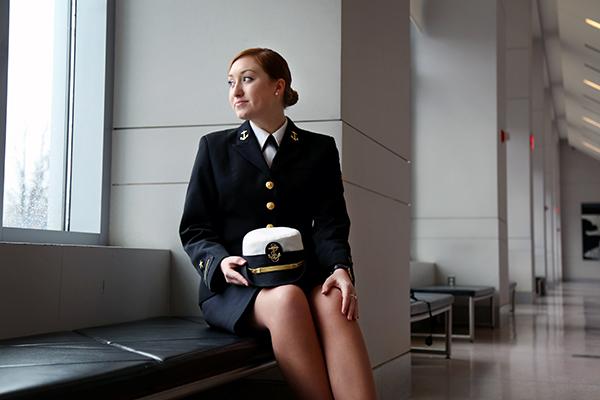A senior received an award from the U.S. Navy for her accomplishments in researching military strategy.
Midshipman Annie McDonald was announced as a winner of the first annual SECNAV Innovation Awards last week. Her winning research analyzed the nuclear assets of the United States and how these assets stacked up against other nations. In the project, she also offered suggestions on how the Navy could downsize and reorganize their weapon variants to save and reallocate money.
The awards, which recognize innovation in Naval projects, were first announced in August. As a winner, McDonald is eligible for a fellowship, specialized training, the choice of her next duty station or a cash award of up to $5,000.
McDonald said the program gave her a chance to learn more about strategic planning and added that if upcoming officers participate, they will be able to better understand their roles in the Navy and introduce original ideas.
“Ideas have to come from somewhere. At the bottom of the rank structure we just assume that mysterious admirals have some divine knowledge about strategic planning,” McDonald said. “It is encouraging that the SECNAV reached out to those of us in the Navy with less important roles.”
She said she will continue to explore nuclear assets and military strategy while interning at an applied physics lab at Johns Hopkins University this summer.
As a part of the ROTC program, McDonald will complete five years of military service after she graduates. She then hopes to attend flight school and eventually become a Naval aviator – one of the most competitive roles in the Navy – before trying to become an astronaut.
“Originally, before I was even interested in the military, I actually wanted to be an astronaut. So, I was looking at how to become an astronaut, and usually the answer is you apply into the Navy or the Air Force,” McDonald said. “Now I would definitely be happy doing anything, but a pilot is definitely my first choice.”
McDonald said she was drawn to the Navy because it gives her a chance to apply her engineering knowledge in an active setting.
“The diverse people, opportunity for adventure and hard-working culture interested me the most,” McDonald said. “It is eye-opening to be part of something so much bigger than yourself.”
McDonald is also a member of the University Honors Program and the International Mechanical Engineering Honor Society. Last year, she won Midshipman of Year for the Third Class and a Leadership Award from the Military Order of the Purple Heart.
She began researching military strategy as part of a nuclear strategy class taught by Murray Snyder, a professor of mechanics and engineering and a retired naval captain. McDonald decided to develop her topic further, and then to apply for the awards.
Snyder said McDonald stood out because of her ability to succeed in classes in both international affairs and engineering.
“She is an excellent student. She had taken a couple of my courses in the school of engineering and did really well in those courses, and she works very hard, and she asks good questions,” Snyder said. “She’s a capable student with a bright future in the Navy.”
Captain James Wyatt, the commanding officer of Navy ROTC and a professor of naval science, said that when he found out that a midshipman in his battalion had won the Innovation Scholar Award, he immediately wanted to meet her.
“She is very outgoing. She’ll shake your hand and look you straight in the eye,” Wyatt said. “She is not intimidated at all. She is going to be a great officer when she gets out there in the fleet.”
Wyatt said that when he spoke with McDonald, she was “very modest” about her paper.
“This is something that is outside of her course of study. This is something that she got a little bit interested in, and she just took a chance, and wrote about it, and submitted the paper,” Wyatt said. “And look at how well she’s done.”







